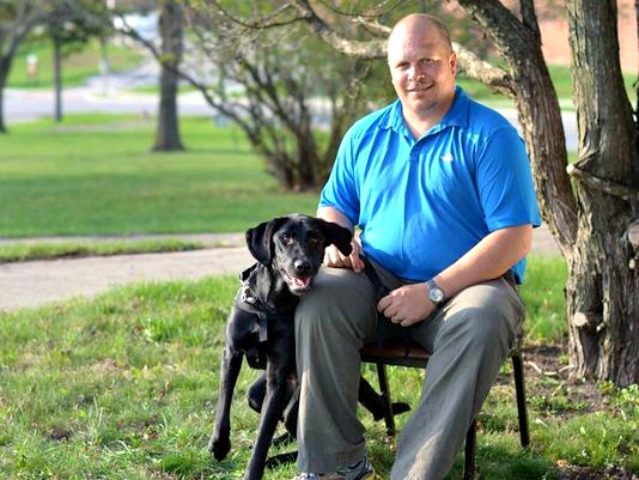The family of a U.S. Army Gulf War veteran who suffered from post-traumatic stress disorder (PTSD) and committed suicide by cop is being consoled by his service dog.
Honor, the PTSD service dog of Wade Allen Baker, 44, of Clyde, North Carolina, was gifted to his family.
“Honor was never just Wade Baker’s dog – and now there would be others in need of healing,” reports The Associated Press (AP).
Baker was killed on August 19 during a standoff with police at a little church in the western North Carolina mountains, ending his quarter-century battle with PTSD. He made an emergency call claiming four people had been shot at the church.
Baker reportedly told his friend, who tried desperately to persuade him to surrender, that it was time for him to be “put down.” According to an unnamed police officer quoted by AP, Baker called a crisis hotline the day of the shooting and vowed “He would die by law enforcement.”
The law enforcement officers returned fire when Baker shot at them. He was struck nine times.
“He’s the last connection that the boys have with their father,” Michelle, Baker’s second wife, told AP, referring to the service dog.
“Honor gave the boys their dad for more years,” she added, tears rolling down her cheeks. “And that’s an amazing gift.”
Honor, a Labrador retriever, was trained by the Paws & Effect charity to assist disabled children and combat veterans suffering from PTSD.
Baker, an Iowa native who served in the Army from 1988 until he was honorably discharged in 1998, received the dog in 2012.
Normally, if a recipient dies, the service dog is given to another veteran or child, but the charity made an exception and gifted Honor to the Baker family.
“I’m sure if we gave the dog the choice, he’d prefer not to be uprooted,” said Michelle.
It reportedly took years for Baker to admit that the had a problem, despite being plagued by memories and delusions associated with his deployments in the 1990s.
He was deployed to the Gulf War in the early 1990s and also served back-to-back tours in war-torn Bosnia-Herzegovina and Macedonia in the mid-1990s.
“Even after his wife convinced him to get treatment, he never stopped looking for a cure – that ‘magic pill’ that would allow him to go back to work, back to normal,” notes AP. “For a while, he thought Honor was it. In the end, even this bundle of unconditional love wasn’t enough for him.”
After the fatal shooting, police officers found the service dog unharmed at Baker’s trailer.
AP reports that “Michelle believes Baker left him behind because he didn’t want him to get hurt – or to try to stop his master.”
“This summer when he saw his master lying in the flag-draped casket, Honor pushed through the clutch of weeping family members, reared up, placed his paws on the edge and tried to climb in,” adds the report. “Unable to comfort Baker, the lanky black dog in the camouflage-patterned vest curled up underneath.”
“It was almost as if Honor was saying, ‘This is my last watch,’” Susannah Smith, Michelle’s cousin, wrote in an email to AP, “and stayed there to protect Wade.”
Baker had two girls with his first wife Diane and two sets of twins with his second wife, who already had two sons of her own when they got married.
When he reached out to the Department of Veteran Affairs (VA) in 2007, Baker was told it would take several months before he could receive any kind of treatment.
That’s when Baker began to see suicide as the only way out, reports AP.
“You’re playing a game of chess,” he said. “And you realize you’re two moves away from checkmate.”
It took him landing in a psychiatric unit after a high-speed chase with police for a doctor to get him into the Iowa City VA. He was diagnosed with PTSD, but the VA did not declare him 100 percent disabled until 2009.
“The VA doesn’t pay to provide service dogs for PTSD sufferers,” points out AP. “However, the agency is in the midst of a three-year study of the animals’ potential benefits to veterans – or harms, such as possibly distancing themselves from human contact.”
Conceding that “Many veterans report a great calming and comforting effect from having a service dog,” Dr. Chris Crowe Sr., a VA clinical psychologist, said, “There’s a real difference between feeling better and treating these disorders that can derail a person’s life.”

COMMENTS
Please let us know if you're having issues with commenting.